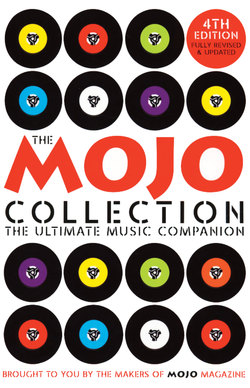Читать книгу The Mojo Collection - Various Mojo Magazine - Страница 54
На сайте Литреса книга снята с продажи.
Jackson C Frank Jackson C Frank American troubadour records prototype singer-songwriter LP, influencing Nick Drake, Simon & Garfunkel, Sandy Denny and others in the process
ОглавлениеRecord label: Columbia
Produced: Paul Simon
Recorded: CBS Studios, New Bond Street, London; spring 1965
Released: Summer 1965
Chart Peaks: None (UK) None (US)
Personnel: Jackson C Frank (g, v); Al Stewart (g)
Track listing: Blues Run The Game; Don’t Look Back; Kimbie; Yellow Walls; Here Come The Blues; Milk And Honey; My Name Is Carnival; Dialogue; Just Like Anything; You Never Wanted Me
Current CD: Castle CMEDD762 adds a second disc of unreleased tracks and alternate takes.
Further listening: The above CD covers pretty much everything Frank recorded.
Further reading: www.blueangel.demon.co.uk/jcfrank/ (fan site); www.folkblues.co.uk/artistsfrank.htm
Download: Not currently legally available
Years before confessional singer-songwriting was in vogue, the enigmatic Jackson Carey Frank recorded an album that more or less defined the genre, describing it in his sleevenotes as ‘the newspaper obituary of my inner self’. Yet whilst his acolytes achieved fame and fortune in his wake, his sad life bore out the words of his most famous song, the beautiful, prematurely world-weary ‘Blues Run The Game’: ‘Maybe tomorrow honey, someplace down the line/I’ll wake up older, and I’ll just stop all my trying.’
Born in Buffalo, NY in 1943, Frank’s entire life was blighted by a terrible fire that engulfed his school when he was 11, killing eighteen of his classmates and giving him third degree burns. Whilst he eventually recovered his mobility, physically and mentally he was scarred for life. After a slow convalescence during which he taught himself guitar, Frank gained access to a huge insurance payout when he turned 21 in 1964, and set sail for England in search of the high life, writing ‘Blues Run The Game’ en route.
He could not have arrived at a better time. The UK folk scene was blossoming and Frank largely abandoned his bacchanalian aspirations in favour of the bohemian club lifestyle, retaining only a dandified dress sense, an Aston Martin and a large collection of Martin guitars. He soon became romantically involved with Sandy Denny and moved in with Al Stewart and fellow expats Paul Simon and Art Garfunkel, all waiting for stardom. Simon was quick to appreciate Frank’s talent and offered to produce an album for him. Recorded in a single three-hour session in mid-1965, it melds traditional sounds (‘Kimbie’) with protest (‘Don’t Look Back’), stream of consciousness (‘My Name Is Carnival’) and the more personal, melancholy songs (‘Blues Run The Game’, ‘You Never Wanted Me’) that were to have such an impact on the next generation of UK songwriters. Despite the extreme nerves that he experienced in the studio, where he insisted on recording behind a screen, his singing and picking are exceptional throughout. The album was rapturously received in folk circles and played to death by aspiring singers across the UK.
Despite this triumph, Frank found it hard to maintain his creativity. After abortive attempts at a follow-up, and having blown most of his money, in 1968 he fled homewards to an increasingly lonely and depressing existence. For much of the next 30 years he would be destitute, living either on the streets or in mental hospitals, too dispirited to contact old acquaintances and too infirm to perform. A broken man, Frank died in March 1999.
